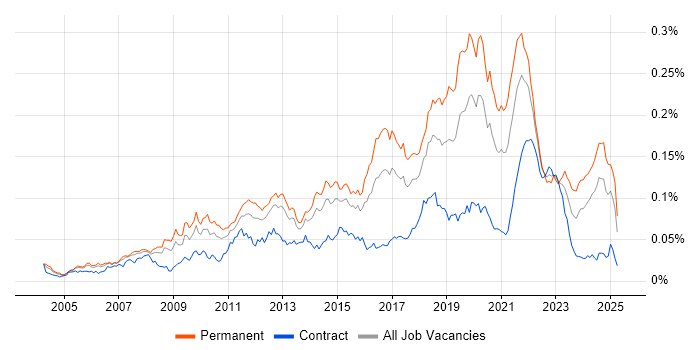Legacy Code
UK > England
The table below looks at the prevalence of the term Legacy Code in permanent job vacancies in England. Included is a benchmarking guide to the salaries offered in vacancies that cited Legacy Code over the 6 months leading up to 24 February 2026, comparing them to the same period in the previous two years.
| 6 months to 24 Feb 2026 |
Same period 2025 | Same period 2024 | |
|---|---|---|---|
| Rank | 605 | 561 | 698 |
| Rank change year-on-year | -44 | +137 | +167 |
| Permanent jobs citing Legacy Code | 33 | 92 | 57 |
| As % of all permanent jobs in England | 0.054% | 0.22% | 0.085% |
| As % of the Miscellaneous category | 0.17% | 0.57% | 0.24% |
| Number of salaries quoted | 29 | 80 | 52 |
| 10th Percentile | £39,750 | £48,694 | £45,125 |
| 25th Percentile | £52,500 | £62,500 | £55,000 |
| Median annual salary (50th Percentile) | £100,000 | £85,000 | £85,000 |
| Median % change year-on-year | +17.65% | - | +70.00% |
| 75th Percentile | £125,000 | £95,000 | £105,000 |
| 90th Percentile | - | £115,000 | £107,500 |
| UK median annual salary | £96,250 | £72,500 | £85,000 |
| % change year-on-year | +32.76% | -14.71% | +65.05% |
All Generic Skills
England
Legacy Code falls under the General and Transferable Skills category. For comparison with the information above, the following table provides summary statistics for all permanent job vacancies requiring generic IT skills in England.
| Permanent vacancies with a requirement for generic IT skills | 19,952 | 16,243 | 24,206 |
| As % of all permanent jobs advertised in England | 32.66% | 38.15% | 36.15% |
| Number of salaries quoted | 10,258 | 7,800 | 18,147 |
| 10th Percentile | £28,250 | £33,500 | £28,500 |
| 25th Percentile | £37,500 | £46,250 | £39,720 |
| Median annual salary (50th Percentile) | £55,000 | £62,500 | £55,000 |
| Median % change year-on-year | -12.00% | +13.64% | -15.38% |
| 75th Percentile | £78,800 | £85,000 | £78,750 |
| 90th Percentile | £100,000 | £115,000 | £100,000 |
| UK median annual salary | £55,000 | £62,500 | £55,000 |
| % change year-on-year | -12.00% | +13.64% | -15.38% |
Legacy Code
Job Vacancy Trend in England
Historical trend showing the proportion of permanent IT job postings citing Legacy Code relative to all permanent IT jobs advertised in England.

Legacy Code
Salary Trend in England
Salary distribution trend for jobs in England citing Legacy Code.

Legacy Code
Salary Histogram in England
Salary distribution for jobs citing Legacy Code in England over the 6 months to 24 February 2026.
Legacy Code
Job Locations in England
The table below looks at the demand and provides a guide to the median salaries quoted in IT jobs citing Legacy Code within the England region over the 6 months to 24 February 2026. The 'Rank Change' column provides an indication of the change in demand within each location based on the same 6 month period last year.
| Location | Rank Change on Same Period Last Year |
Matching Permanent IT Job Ads |
Median Salary Past 6 Months |
Median Salary % Change on Same Period Last Year |
Live Jobs |
|---|---|---|---|---|---|
| London | -5 | 19 | £100,000 | +11.11% | 9 |
| North of England | -17 | 9 | £55,000 | -22.81% | 7 |
| Midlands | -24 | 5 | £42,500 | -34.62% | 2 |
| Yorkshire | -29 | 4 | £51,250 | -18.00% | 4 |
| East Midlands | -43 | 4 | £42,500 | -34.62% | 1 |
| North East | - | 3 | £67,500 | - | 1 |
| North West | -1 | 2 | £55,000 | -24.14% | 2 |
| West Midlands | +9 | 1 | £70,000 | +33.33% | |
| Legacy Code UK |
|||||
Legacy Code
Co-Occurring Skills & Capabilities in England by Category
The following tables expand on the one above by listing co-occurrences grouped by category. They cover the same employment type, locality and period, with up to 20 co-occurrences shown in each category:
|
|
||||||||||||||||||||||||||||||||||||||||||||||||||||||||||||||||||||||||||||||||||||||||||||||||||||||||||||
|
|
||||||||||||||||||||||||||||||||||||||||||||||||||||||||||||||||||||||||||||||||||||||||||||||||||||||||||||
|
|
||||||||||||||||||||||||||||||||||||||||||||||||||||||||||||||||||||||||||||||||||||||||||||||||||||||||||||
|
|
||||||||||||||||||||||||||||||||||||||||||||||||||||||||||||||||||||||||||||||||||||||||||||||||||||||||||||
|
|
||||||||||||||||||||||||||||||||||||||||||||||||||||||||||||||||||||||||||||||||||||||||||||||||||||||||||||
|
|
||||||||||||||||||||||||||||||||||||||||||||||||||||||||||||||||||||||||||||||||||||||||||||||||||||||||||||
|
|
||||||||||||||||||||||||||||||||||||||||||||||||||||||||||||||||||||||||||||||||||||||||||||||||||||||||||||
|
|
||||||||||||||||||||||||||||||||||||||||||||||||||||||||||||||||||||||||||||||||||||||||||||||||||||||||||||
|
|
||||||||||||||||||||||||||||||||||||||||||||||||||||||||||||||||||||||||||||||||||||||||||||||||||||||||||||
